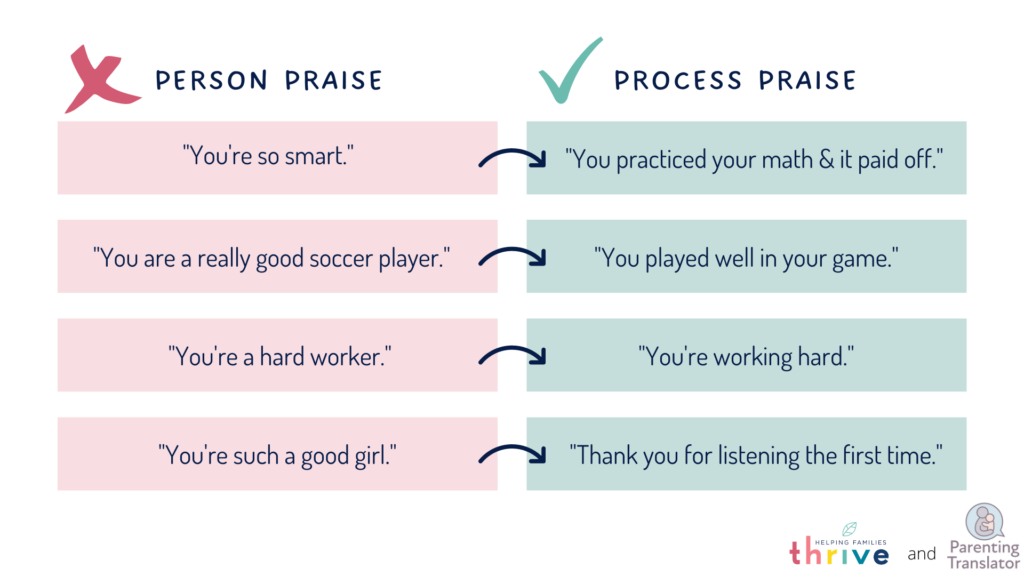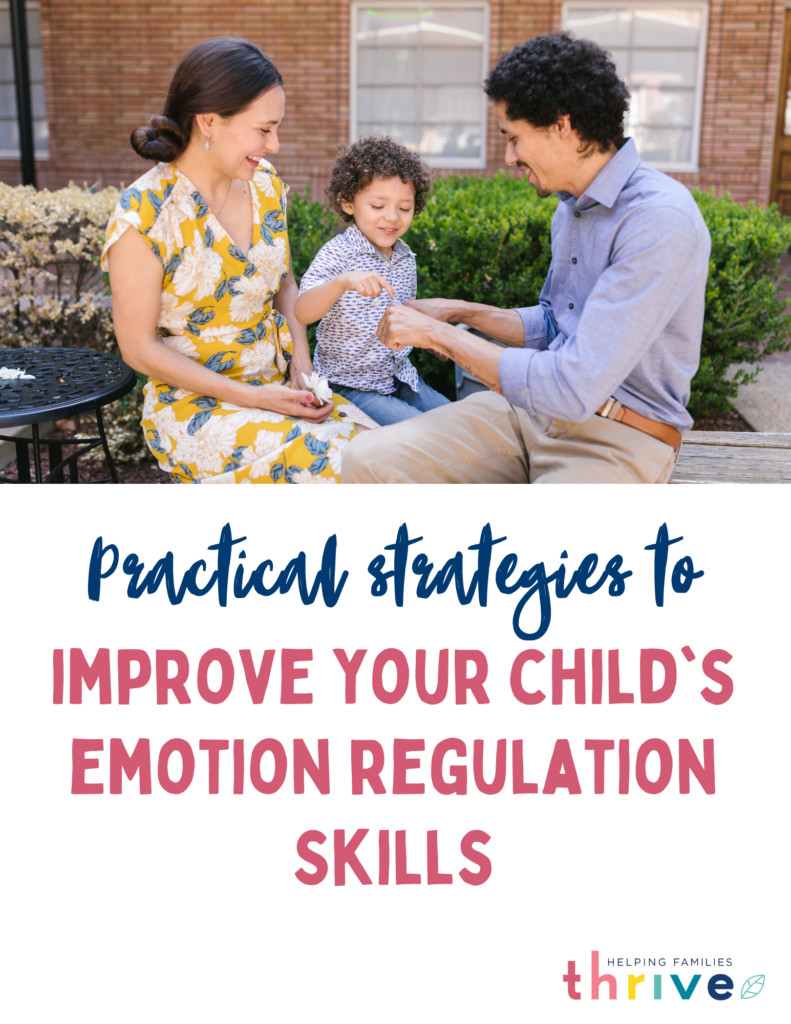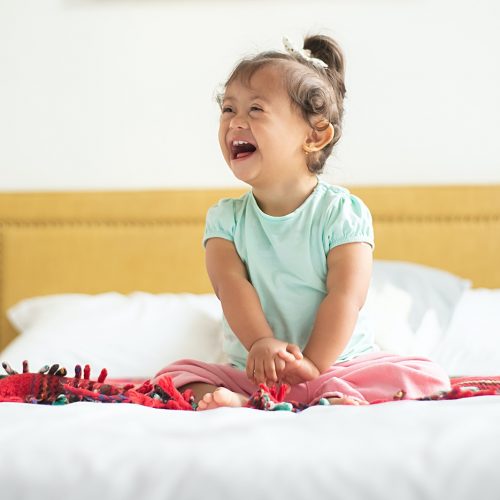
Many loving parents feel a natural desire to praise their children. Yet, recently, there seems to be a backlash against praise, particularly on social media.
So what does the research actually find about praising children? Is it an effective way to encourage children and improve the parent-child relationship? Or will it make our children overly dependent on the approval of others and lacking in internal motivation?
Research on praise
Thankfully, we have many studies to guide our understanding of how praise impacts children. This research tells us that praise generally has a positive impact. For example, praise in toddlerhood predicts better motivation and improved academic performance many years later (1). In addition, praise is associated with increased intrinsic motivation to engage in kind and helpful behavior (2, 3), enhanced social competence (4), and less conduct problems later on (5).
Research also suggests that parent praise may influence brain development and child personality traits. A recent study (6) showed that parental praise is associated with more conscientiousness and openness to experience in kids as well as increased gray matter in an area of the brain associated with empathy, emotional regulation and auditory processing.
There is also research to suggest that kids who receive more praise from parents go on to have better relationships in adulthood. A large national survey found that that children whose parents praised or hugged them more frequently during childhood experienced more family support and connectedness during adolescence and were more satisfied in their romantic relationships as young adults. Additionally, praise was found to offset some of the negative effects of harsh parenting (7).
Finally, praise is a core tenet of positive parenting, as defined by research, and is an essential part of most evidence-based parenting programs (8, 9). This is important because evidence-based parenting programs, such as The Incredible Years, show short- and long-term benefits for both parents and children (read this blog post for more).
RELATED: Want to learn more about positive parenting? Need practical strategies for how to discipline without yelling? Get our FREE cooperation guide here. For even more, check out our comprehensive Essentials parenting e-course.
How we praise kids matters
Clearly there is a lot of positive that come from praise, so does that mean we should start pouring it on? Not so fast! While research does overwhelmingly indicate that praise is beneficial for kids, it also tells us that how you praise your child matters. Some types of praise are better than others.
Here are some research-backed guidelines to help you increase your child’s internal motivation, build self-esteem, and see more positive behaviors.
1. Praise the process not the person
Praise your child’s effort, strategy, and process, rather than praising traits about them that they cannot change as easily such as intelligence, athleticism, or beauty. Research finds that this type of “process praise” enhances children’s internal motivation and persistence in the face of challenge (10, 11, 12), which leads to improved academic performance (1).
Person praise, such as “you’re so smart,” can actually have the opposite effect of process praise. It tends to make children fixate on their errors (13), give up more easily (10, 13), and blame themselves (14). Importantly, even person-centered praise aimed at effort (“you’re a hard worker”) can lead to less enjoyment and feelings of failure (15). Swapping this statement to “you’re working hard” can make all the difference!

2. Use supportive rather than controlling praise
The goal of praise should be to encourage rather than control. That means praise should support your child’s autonomy and encourage their own judgement of themselves. For example, say something like “It looks like you really enjoyed that” rather than “It makes me so happy when you score a goal” (16, 17).
3. Avoid comparison
When you use praise to compare your child to other children, it seems to enhance performance in the short-term (18). Unfortunately, in the long-term, praise may be related to individuals judging their performance based only in relation to other people rather than meeting their own goals or enjoying it themselves (19). However, it is important to note that these findings may not apply to individuals from collectivist cultures (20).
4. Be specific (when possible)
Research finds that praise with specific information helps children to improve their behavior in the future. For example, a statement like “great job putting your toys back in the bin when you were done using them” is more beneficial than “great job” (21, 22). If you simply say “great job” after your child cleans up their toys, they may not know what you are referring to.
However, it is important to mention that a recent study found that even general and vague praise (“Yea” in this study) does not undermine persistence or make kids view themselves more negatively (23). This tells us that simple praise is still beneficial for motivation (as it is a type of process praise), but we might be able to add additional impact by being more specific.
5. Use gestures as praise
Not all praise has to be verbal! In fact, it’s helpful to use simple gestures (high fives, thumbs up, etc.) to encourage your child occasionally. Research finds that gestures may be even more effective than process praise in improving children’s self-evaluation, that is their own judgement of how they did and how they feel (23).
6. Be sincere
Kids are perceptive and notice when parents aren’t being sincere, and this is confirmed by research. When children sense that their parents are either over- or under- praising their performance, they are more likely to experience depression and lower academic performance (24). Research also finds that overly effusive praise (“That is the most beautiful drawing I have ever seen”) is associated with children with low self-esteem, avoiding challenges, and becoming overly dependent on praise (25).
6. Combine praise with positive attention
The final tip for using praise effectively is to combine it with a positive nonverbal gesture, such as a hug, smile, pat, or other type of physical affection. This combined approach seems to be the most effective in improving behavior (26).
Final thoughts
In summary, praise enhances motivation and perseverance and improves behavior when it is sincere, suggests that the child has control over improving the outcome, supportive rather than controlling, encouraging of internal motivation, does not compare the child to others, and is specific and accurate. However, parents do not have to do this perfectly. Research finds that as long as the majority of praise they hear is process praise (3 out of 4 times) children show increased persistence and improved self-evaluation (12).
References
- Gunderson, E. A., Sorhagen, N. S., Gripshover, S. J., Dweck, C. S., Goldin-Meadow, S., & Levine, S. C. (2018). Parent praise to toddlers predicts fourth grade academic achievement via children’s incremental mindsets. Developmental psychology, 54(3), 397.
- Dahl, A., Satlof-Bedrick, E. S., Hammond, S. I., Drummond, J. K., Waugh, W. E., & Brownell, C. A. (2017). Explicit scaffolding increases simple helping in younger infants. Developmental psychology, 53(3), 407.
- Ulber, J., Hamann, K., & Tomasello, M. (2016). Extrinsic rewards diminish costly sharing in 3‐year‐olds. Child Development, 87(4), 1192-1203.
- Shinohara, R., Sugisawa, Y., Tong, L., Tanaka, E., Watanabe, T., Onda, Y., … & Japan Children’s Study Group. (2010). The trajectory of children’s social competence from 18 months to 30 months of age and their mother’s attitude towards the praise. Journal of epidemiology, 1002160139-1002160139.
- Chronis, A. M., Lahey, B. B., Pelham Jr, W. E., Williams, S. H., Baumann, B. L., Kipp, H., … & Rathouz, P. J. (2007). Maternal depression and early positive parenting predict future conduct problems in young children with attention-deficit/hyperactivity disorder. Developmental psychology, 43(1), 70.
- Matsudaira, I., Yokota, S., Hashimoto, T., Takeuchi, H., Asano, K., Asano, M., … & Kawashima, R. (2016). Parental praise correlates with posterior insular cortex gray matter volume in children and adolescents. PLoS One, 11(4), e0154220.
- Parade, S. H., Supple, A. J., & Helms, H. M. (2012). Parenting during childhood predicts relationship satisfaction in young adulthood: A prospective longitudinal perspective. Marriage & Family Review, 48(2), 150-169.
- Hahlweg, K., Heinrichs, N., Kuschel, A., Bertram, H., & Naumann, S. (2010). Long-term outcome of a randomized controlled universal prevention trial through a positive parenting program: is it worth the effort?. Child and adolescent psychiatry and mental health, 4(1), 1-14.
- Leijten, P., Gardner, F., Melendez-Torres, G. J., Van Aar, J., Hutchings, J., Schulz, S., … & Overbeek, G. (2019). Meta-analyses: Key parenting program components for disruptive child behavior. Journal of the American Academy of Child & Adolescent Psychiatry, 58(2), 180-190.
- Cimpian, A., Arce, H. M. C., Markman, E. M., & Dweck, C. S. (2007). Subtle linguistic cues affect children’s motivation. Psychological Science, 18(4), 314-316.
- Mueller, C. M., & Dweck, C. S. (1998). Praise for intelligence can undermine children’s motivation and performance. Journal of personality and social psychology, 75(1), 33.Zentall & Morris, 2010
- Zentall, S. R., & Morris, B. J. (2010). “Good job, you’re so smart”: The effects of inconsistency of praise type on young children’s motivation. Journal of experimental child psychology, 107(2), 155-163.
- Zentall, S. R., & Morris, B. J. (2012). A critical eye: Praise directed toward traits increases children’s eye fixations on errors and decreases motivation. Psychonomic bulletin & review, 19(6), 1073-1077.
- Kamins, M. L., & Dweck, C. S. (1999). Person versus process praise and criticism: implications for contingent self-worth and coping. Developmental psychology, 35(3), 835.
- Reavis, R., Miller, S. E., Grimes, J. A., & Fomukong, A. N. (2017). Person-focused Effort Praise: “Hard Worker” Has Negative Effects for Adults After a Failure.
- Reeve, J., Jang, H., Hardre, P., & Omura, M. (2002). Providing a rationale in an autonomy-supportive way as a strategy to motivate others during an uninteresting activity. Motivation and emotion, 26(3), 183-207.
- Mouratidis, A., Lens, W., & Vansteenkiste, M. (2010). How you provide corrective feedback makes a difference: The motivating role of communicating in an autonomy-supporting way. Journal of sport and exercise psychology, 32(5), 619-637.
- Gaines, L. M., Duvall, J., Webster, J. M., & Smith, R. H. (2005). Feeling good after praise for a successful performance: The importance of social comparison information. Self and Identity, 4(4), 373-389.
- Corpus, J. H., Ogle, C. M., & Love-Geiger, K. E. (2006). The effects of social-comparison versus mastery praise on children’s intrinsic motivation. Motivation and emotion, 30(4), 333-343.
- Lin, S., Fong, C. J., & Wang, Y. (2017). Chinese undergraduates’ sources of self-efficacy differ by sibling status, achievement, and fear of failure along two pathways. Social Psychology of Education, 20(2), 361-386.
- Haydon, T., & Musti-Rao, S. (2011). Effective use of behavior-specific praise: A middle school case study. Beyond Behavior, 20(2).
- Stormont, M., & Reinke, W. (2009). The importance of precorrective statements and behavior-specific praise and strategies to increase their use. Beyond behavior, 18(3), 26-32.
- Morris, B. J., & Zentall, S. R. (2014). High fives motivate: The effects of gestural and ambiguous verbal praise on motivation. Frontiers in Psychology, 5, 928.
- Lee, H. I., Kim, Y. H., Kesebir, P., & Han, D. E. (2017). Understanding when parental praise leads to optimal child outcomes: Role of perceived praise accuracy. Social Psychological and Personality Science, 8(6), 679-688.
- Brummelman, E., Thomaes, S., Overbeek, G., Orobio de Castro, B., Van Den Hout, M. A., & Bushman, B. J. (2014). On feeding those hungry for praise: Person praise backfires in children with low self-esteem. Journal of Experimental Psychology: General, 143(1), 9.
- Owen, D. J., Slep, A., & Heyman, R. E. (2012). The effect of praise, positive nonverbal response, reprimand, and negative nonverbal response on child compliance: A systematic review. Clinical child and family psychology review, 15(4), 364-385.





